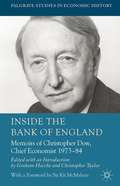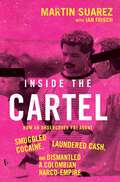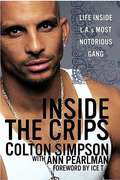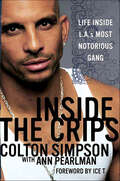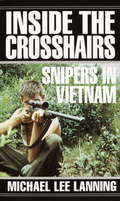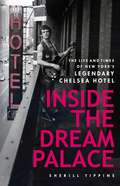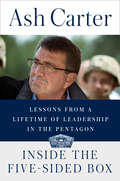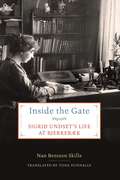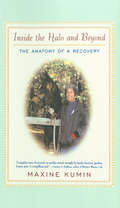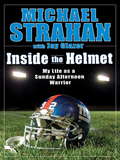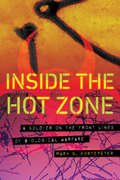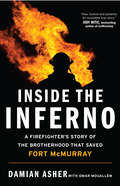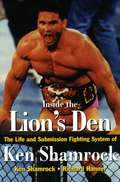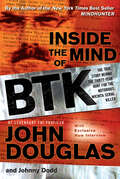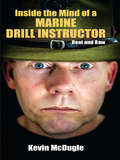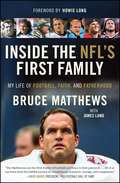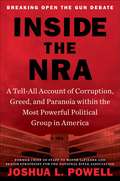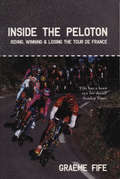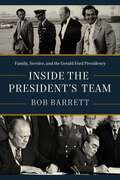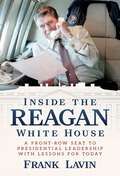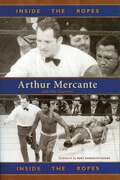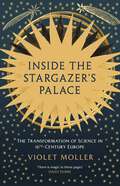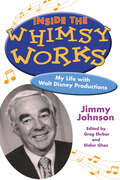- Table View
- List View
Inside the Bank of England
by Christopher Taylor Graham HaccheA personal memoir from Christopher Dow, an influential British economist and a key player in the banking establishments of the post-war era. Contains insights and revelations into the issues and protagonists shaping British economic policy in the late 20th Century.
Inside the Cartel: How an Undercover FBI Agent Smuggled Cocaine, Laundered Cash, and Dismantled a Colombian Narco-Empire
by Ian Frisch Martin Suarez“Truth is always stranger than fiction. . . A stunning, riveting and extraordinary real-life story of life in the shadows." –#1 International Bestselling Author Don WinslowThe gripping true story, that reads like fiction, of how legendary FBI Special Agent Martin Suarez went deep undercover—and lived a double-life for years—to infiltrate Colombia's most insidious drug cartels.Martin Suarez, a legend within the FBI who specialized in Colombian drug cartels, holds the record for the longest time spent continuously undercover. As his alter ego Manny, Martin followed the unspoken rules of the cartels: He knew the right lingo to use, the right whiskey to drink, the right watch to wear, the wrong questions to ask. He smuggled over $1 billion worth of cocaine into the United States for the Medellín Cartel and, as his cover deepened, he graduated to become a high-level money launderer for the North Coast Cartel. He helped wash tens of millions of dollars worth of drug money, ensnaring himself in a high-stakes game of cat and mouse while simultaneously exposing the Black Market Peso Exchange, the most insidious money laundering apparatus in the world that involved billionaire bankers, blue-chip American corporations, and even the President of Colombia himself.Martin was raised by a father who served in the military and valorized the nobility of the FBI, and Martin stopped at nothing to allow his father to live vicariously through his son. He wanted nothing more than to make his father proud—and to be a good husband to his wife, and a loving father to his two young sons. He became a man caught between two worlds—that of an undercover agent who wanted to rid the world of its evils, but also that of a family man who was trying not to lose himself in this dark, brutal underworld that captivated the globe during the War on Drugs.And yet his worlds begin to collide as danger creeps dangerously close to his doorstep when his cover is blown and a cartel-hired sicario comes hunting for him.Inside the Cartel is told with the pulse-racing action of a Hollywood blockbuster. This is the story of Suarez and his time undercover and how maintaining the trust of hardened criminals can start to tear away at even the most principled soldier.
Inside the Crips: Life Inside L. A.'s Most Notorious Gang
by Ann Pearlman Colton Simpson Ice TInside the Cripsis a memoir of Colton Simpson's life as a Crip -- beginning at the tender age of ten in the mid 70s -- and his prison turnaround twenty-five years later.
Inside the Crips: Life Inside L.A.'s Most Notorious Gang
by Ann Pearlman Colton Simpson“[An] arresting memoir” about one man’s life in an L. A. street gang, from age ten in the 1970s to his prison turnaround twenty-five years later (Publishers Weekly).Colton “C-Loc” Simpson was a Crip. Beginning at the age of ten in the mid-1970s, Simpson’s world was defined in terms of war. By the time he quit, Simpson had risen through the ranks to become Stabilizer and, later, General.Simpson was the son of Dick Simpson, a ballplayer for the California Angels and Cincinnati Reds, but even before he became a gangbanger, his life was rough. Raised by his grandmother in South Central L.A. Simpson didn’t so much turn to the streets as become engulfed by them: without asking to become part of the gang, his forced induction into the Crips meant running don an alley while the members opened fire on him.Inside the Crips is Simpson’s unstinting account—emotional, violent, ugly, and tender—of life inside a gang. You’ll meet intense characters such as Smiley, Simpson’s fellow gangbanger, and heartbreaking ones such as Gina, the mother of two young sons who married Simpson in prison.With a foreword by Ice T“The book provides a window into an often misunderstood way of life.” —Publishers Weekly“The Crips . . . is a famously difficult organization from which to retire alive. . . . This unvarnished portrayal of gang life is enlightening and even inspiring about a subject badly in need of illumination.” —Booklist
Inside the Crosshairs
by Col. Michael Lee Lanning"The American sniper could be regarded as the greatest all-around rifleman the world has ever known. . . ."At the start of the war in Vietnam, the United States had no snipers; by the end of the war, Marine and army precision marksmen had killed more than 10,000 NVA and VC soldiers--the equivalent of an entire division--at the cost of under 20,000 bullets, proving that long-range shooters still had a place in the battlefield. Now noted military historian Michael Lee Lanning shows how U.S. snipers in Vietnam--combining modern technology in weapons, ammunition, and telescopes--used the experience and traditions of centuries of expert shooters to perfect their craft. To provide insight into the use of American snipers in Vietnam, Lanning interviewed men with combat trigger time, as well as their instructors, the founders of the Marine and U.S. Army sniper programs, and the generals to whom they reported. Backed by hard information and firsthand accounts, the author demonstrates how the skills these one-shot killers honed in the jungles of Vietnam provided an indelible legacy that helped save American lives in Grenada, the Gulf War, and Somalia and continues to this day with American troops in Bosnia.
Inside the Dream Palace
by Sherill TippinsThe Chelsea Hotel, since its founding by a visionary French architect in 1884, has been an icon of American invention: a cultural dynamo and haven for the counterculture, all in one astonishing building. Sherill Tippins, author of the acclaimed February House, delivers a masterful and endlessly entertaining history of the Chelsea and of the successive generations of artists who have cohabited and created there, among them Thomas Wolfe, Dylan Thomas, Arthur Miller, Allen Ginsberg, Bob Dylan, Janis Joplin, Leonard Cohen, Patti Smith, Robert Mapplethorpe, Andy Warhol, Sam Shepard, Sid Vicious, and Dee Dee Ramone. Now as legendary as the artists it has housed and the countless creative collaborations it has sparked, the Chelsea has always stood as a mystery as well: why and how did this hotel become the largest and longest-lived artists' community in the known world? Inside the Dream Palace is the intimate and definitive story.
Inside the Five-Sided Box: Lessons from a Lifetime of Leadership in the Pentagon
by Ash CarterThe twenty-fifth Secretary of Defense takes readers behind the scenes to reveal the inner workings of the Pentagon, its vital mission, and what it takes to lead it. The Pentagon is the headquarters of the single largest institution in America: the Department of Defense. The D.O.D. employs millions of Americans. It owns and operates more real estate, and spends more money, than any other entity. It manages the world’s largest and most complex information network and performs more R&D than Apple, Google, and Microsoft combined. Most important, the policies it carries out, in war and peace, impact the security and freedom of billions of people around the globe. Yet to most Americans, the dealings of the D.O.D. are a mystery, and the Pentagon nothing more than an opaque five-sided box that they regard with a mixture of awe and suspicion. In this new book, former Secretary of Defense Ash Carter demystifies the Pentagon and sheds light on all that happens inside one of the nation’s most iconic, and most closely guarded, buildings. Drawn from Carter’s thirty-six years of leadership experience in the D.O.D., this is the essential book for understanding the challenge of defending America in a dangerous world—and imparting a trove of incisive lessons that can guide leaders in any complex organization. In these times of great disruption and danger, the need for Ash Carter’s authoritative and pragmatic account is more urgent than ever.
Inside the Gate: Sigrid Undset's Life at Bjerkebæk
by Nan Bentzen SkilleNobel Prize winner Sigrid Undset&’s life at Bjerkebæk, her retreat in Lillehammer, NorwayInside the Gate offers readers a rare glimpse into Sigrid Undset&’s life at her home, Bjerkebæk, now a museum and national landmark in Lillehammer, Norway. Immensely protective of her privacy, Undset filled the timbered house with books and created a writing space where she authored many of her famous works, including Kristin Lavransdatter. There she also raised her three children, tended to her beloved garden, and welcomed close friends and family members during three decades of personal joys, sorrows, and hard work.Drawing on a wealth of historical documents, Nan Bentzen Skille&’s lively narrative presents an intimate portrait of Sigrid Undset&’s intense emotional life and creative endeavors, with Bjerkebæk at the center of it all. Many photographs vividly illustrate the text. For readers who have long admired Undset&’s literature, Inside the Gate provides new insight into the life and work of the Nobel Prize winner.
Inside the Halo and Beyond: The Anatomy of a Recovery
by Maxine Kumin"Here is a singular story of survival, an earthly miracle wrought by family devotion, gardens, horses, guts. A compelling read."--Carolyn Heilbrun In July 1998, when Maxine Kumin's horse bolted at a carriage-driving clinic, she was not expected to live. Yet, less than a year later, her progress pronounced a miracle by her doctors, she was at work on this journal of her astonishing recovery. She tells of her time "inside the halo," the near-medieval device that kept her head immobile during weeks of intensive care and rehabilitation, of the lasting "rehab" friendships, and of the loving family who always believed she would heal. "[S]he resonates wisdom while announcing a triumph of body and soul."--Anne Roiphe, New York Times Book Review "Maxine Kumin brings the sensitivity and imagination of a poet to her extraordinary ordeal."--Richard Selzer, author of Mortal Lessons: Notes on the Art of Surgery "From a singular experience she has created a lesson that is universal, which, it seems to me, is the essence of being a poet."--Abraham Verghese, author of The Tennis Partner
Inside the Helmet
by Michael Strahan Jay GlazerFollowing a magical season that ended in Super Bowl glory, one of the NFL's biggest stars delivers a no-holds-barred, hardhitting hitting account of life in the league. Michael Strahan is one of the NFL's most talented players, and he is also one of the game's most vocal personalities. In Inside the Helmet, Strahan exposes all of the pressure, pain, and glory of life in the NFL, venturing into territory no previous football author has had the nerve to tread. Bringing the reader right into the middle of the action, Strahan recounts exhilarating victories and reveals the hair-raising details of the ruthless grit required for every win. He gives an honest account of the brutality on the field and the myriad injuries from which he continues to suffer. He describes the relationships among teammates (including an account of his well publicized feuding with Tiki Barber), the practical jokes players use to preserve their sanity and the violent blow-ups that occur when the pressure gets too intense, and the challenges of taking orders from head coach Tom Coughlin and his squadron of assistant coaches. Strahan also writes about dealing with the relentless media coverage, rabid and demanding fans, and the struggle to live up to a multimillion-dollar salary. Finally, in two new chapters for the paperback edition, Strahan writes about the ups and downs of a truly sensational 2007 season that saw the Giants overcome the odds to win the Super Bowl. For the millions of rabid NFL fans, Inside the Helmet is an all-access pass into the huddle, the locker room, and the minds of the warriors on the field.
Inside the Hot Zone: A Soldier on the Front Lines of Biological Warfare
by Mark G. KortepeterInside the Hot Zone is an insider&’s account of one of the most dangerous workplaces on earth: the United States Army Medical Research Institute of Infectious Diseases (USAMRIID) in Fort Detrick, Maryland. Retired U.S. Army Col. Mark G. Kortepeter, a leading biodefense expert, recounts his journey from the lecture hall to the role of department chief, to the battlefield, to the Biosafety Level-4 maximum containment lab, and finally, to the corner office. During Kortepeter&’s seven and a half years in leadership at USAMRIID, the United States experienced some of the most serious threats in modern germ warfare, including the specter of biological weapons during the Iraq War, the anthrax letters sent after 9/11, and a little-known crisis involving a presumed botulism attack on the president of the United States. Inside the Hot Zone is a shocking, frightening eye-opener as Kortepeter describes in gripping detail how he and his USAMRIID colleagues navigated threats related to anthrax, botulism, smallpox, Lassa, and Ebola. Kortepeter crafts a rich and riveting narrative as he wrestles with life-and-death decisions managing biological weapon exposures. The stories are real, but they could just as easily serve as plotlines in popular fiction or Hollywood thrillers. He gives the reader a seat at the table as each crisis unfolds, with an unvarnished and personal perspective on the dangers, the drama, the fear, the frustrations, the irony, and the uncertainty he encountered as a physician in the role of &“Biodefender.&”
Inside the Inferno: A Firefighter's Story of the Brotherhood that Saved Fort McMurray
by Damian Asher Omar MouallemAn action-packed, on-the-ground memoir of the Fort McMurray wildfire and the courage, resilience, and sacrifice of the firefighters who saved the city.In May 2016, what began as a remote forest fire quickly became a nightmare for the ninety thousand residents of Fort McMurray. A perfect combination of weather, geography and circumstance created a raging wildfire that devoured everything in its path. Winds drove the flames towards the town, forcing the entire population to evacuate. As the fire swept through neighbourhoods, it fell to the men and women of the fire department to protect the city. Born and raised in Fort McMurray, Damian Asher was a fifteen-year veteran and captain in the city’s fire department. Day after day, Damian and his crew remained on the front lines of the burning city. As embers rained down around them, they barely slept, pushing their minds and bodies to the brink as they struggled to contain the fire. As he led his crew through the smoke and the flames, Damian had little time to worry about whether the house he had built for his family was still standing. With media unable to get into the locked-down city, the world watched in hope and fear, wondering what was happening on the fiery streets. Finally, after weeks of battling the wildfire, the firefighters managed to regain control. When the smoke cleared, much of the city had been destroyed. Would things ever be the same? How would the city reunite? What would it take to rebuild life in Fort McMurray?
Inside the Lion's Den
by Ken Shamrock Clixtro Romias Richard HannerInside the Lion's Den is the remarkable story of Ken Shamrock's ascent to the pinnacle of reality martial combat. An inspiration to thousands, Shamrock picked himself up from a troubled youth growing up in group homes to become the legendary warrior who dominated no-holds-barred martial arts competition in both America and Asia. Whether you know him as "King of Pancrase" or The Ultimate Fighting Championship's "Superfight Champion," step inside the Lion's Den for a new look at "The World's Most Dangerous Man." Here, the secrets of Shamrock's ultra-efficient submissions fighting system and his champion training regimen are revealed. With more than 150 photographs, Inside the Lion's Den will shock and amaze you."
Inside the Lion's Den
by Ken Shamrock Clixtro Romias Richard HannerInside the Lion's Den is the remarkable story of Ken Shamrock's ascent to the pinnacle of reality martial combat. An inspiration to thousands, Shamrock picked himself up from a troubled youth growing up in group homes to become the legendary warrior who dominated no-holds-barred martial arts competition in both America and Asia. Whether you know him as "King of Pancrase" or The Ultimate Fighting Championship's "Superfight Champion," step inside the Lion's Den for a new look at "The World's Most Dangerous Man." Here, the secrets of Shamrock's ultra-efficient submissions fighting system and his champion training regimen are revealed. With more than 150 photographs, Inside the Lion's Den will shock and amaze you."
Inside the Mind of BTK: The True Story Behind the Thirty-Year Hunt for the Notorious Wichita Serial Killer
by John Douglas Johnny DoddThe FBI profiler & co-author of the #1 New York Times–bestseller Mindhunter recounts his role in catching one of America&’s most notorious serial killers.Inside the Mind of BTK tells the incredible true story of how FBI profiler John Douglas tracked and participated in the hunt for one of the most notorious serial killers in US history. For thirty-one years a man who called himself BTK (Bind, Torture, Kill) terrorized the city of Wichita, Kansas, sexually assaulting and strangling a series of victims, taunting the police with cryptic communications, and bragging about his vicious crimes to local newspapers and television stations. After disappearing for nine years, he suddenly reappeared, complaining that no one was paying enough attention to him and claiming that he had committed other crimes for which he had not been given credit. When he was finally captured, BTK was revealed to be Dennis Rader, a sixty-one-year-old churchgoing, married man with two children. As a leading serial killer profiler for the FBI, John Douglas was first called to consult about the case in 1980 and remained involved with the story and all of its principal players up to the arrest and prosecution. After Rader was arrested, Douglas was granted both an exclusive interview with the killer after his sentencing, as well as access to friends, family, and police. In this page-turning book, Douglas reveals both new information and insight into why Rader did what he did, why he stopped for a mysterious nine-year period, and his current psychological state in custody. Praise for Inside the Mind of BTK &“Legendary profiler and bestselling author Douglas (Mindhunter), who pioneered the FBI&’s systematic study of serial killers, offers his insights into one of this country&’s most chilling killers—Dennis Rader, a seemingly innocuous family man and municipal employee, whose brutal murders terrorized Wichita, Kans., for three decades. . . . While the stomach-turning story of BTK's crimes has been told by others, Douglas's unique professional experience and his exclusive personal access to Rader offers a different perspective, even as the answer to the question of how such a monster comes to be remains elusive.&” —Publishers Weekly&“Riveting! Douglas and Dodd have focused a laser sight on one of the most fascinating and disturbing serial killers of our time. Their in-depth analysis of BTK&’s early childhood, his seemingly &“normal&” everyday life, and his shockingly well-hidden &“other&” life deftly explores the nature of evil and how we can better protect ourselves from such cunning predators.&” ―Lisa Gardner, New York Times–bestselling suspense author of Hide
Inside the Mind of a Marine Drill Instructor: Real and Raw
by Kevin McDugleInside the Mind of a Marine Drill Instructor is a book that takes you inside the life of Marine Corps Drill Instructor Kevin McDugle. Many fiery moments in recruit training leave lasting impressions for years to come on both the Drill Instructor and the sloppy recruit. Kevin McDugle is just one of the many Drill Instructors who can tell stories of taking lackadaisical civilians and turning them into war-fighting Marines. Inside the Mind of a Marine Drill Instructor is a compilation of those intense and insightful stories by Kevin McDugle. Kevin McDugle served in the Marines from 1988 until 1996. Kevin served in security forces at Bangor, Washington, with 1st Battalion 8th Marines, 2nd ANGLICO and as a Drill Instructor at Paris Island, South Carolina. Kevin is an entrepreneur, inventor and family man. You can read more about Kevin McDugle by visiting kevinmcdugle.com.
Inside the NFL's First Family: My Life of Football, Faith, and Fatherhood
by James Lund Howie Long Bruce MatthewsFrom the man who has played in more NFL games than any non-kicker in the football league’s history comes a memoir about the Matthews family and how eight people over three generations have achieved success in the NFL—more than any other family in sports history.No family has qualified more of its members for the demands and rewards of the National Football League than the Matthews clan—eight and counting over three generations. They include Bruce’s father Clay, an original NFL San Francisco 49er; his brother Clay Jr., a four-time All-Pro for the Cleveland Browns; and nephew Clay III, a Defensive Player of the Year and Super Bowl champion with the Green Bay Packers. Bruce Matthews may be the best of them all, a fourteen-time Pro Bowler with the Houston Oilers and Tennessee Titans, holder of the all-time consecutive starts record for offensive linemen, and inductee in the NFL Hall of Fame. The enduring success of the Matthews family is no accident. Their competitive nature, passion for excellence, never-quit attitude, compassion for the disadvantaged, and love for each other has propelled them to the peak of their abilities and professions. For Bruce, the foundation of it all is his faith in God. Inside the NFL’s First Family shows how the highs and lows of Bruce’s NFL career and expanding responsibilities as a husband and father taught him the lasting significance of his commitment to Christ. This book is a fascinating peek behind the curtain of professional football, featuring the insider stories that every fan craves. It also shows how Bruce and his family successfully dealt with challenges such as depression, cancer, and Down Syndrome. Yet Inside the NFL’s First Family offers readers even more—the principles and beliefs that have enabled the Matthewses to excel in football and in life.
Inside the NRA: A Tell-All Account of Corruption, Greed, and Paranoia within the Most Powerful Political Group in America
by Joshua L. PowellA shocking exposé of rampant, decades-long incompetence at the National Rifle Association, as told by a former member of its senior leadership.Joshua L. Powell is the NRA--a lifelong gun advocate, in 2016, he began his new role as a senior strategist and chief of staff to NRA CEO Wayne LaPierre. What Powell uncovered was horrifying: "the waste and dysfunction at the NRA was staggering."INSIDE THE NRA reveals for the first time the rise and fall of the most powerful political organization in America--how the NRA became feared as the Death Star of Washington lobbies and so militant and extreme as "to create and fuel the toxicity of the gun debate until it became outright explosive."INSIDE THE NRA explains this intentional toxic messaging was wholly the product of LaPierre's leadership and the extremist branding by his longtime PR puppet master Angus McQueen. In damning detail, Powell exposes the NRA's plan to "pour gasoline" on the fire in the fight against gun control, to sow discord to fill its coffers, and to secure the presidency for Donald J. Trump.
Inside the Peloton: Riding, Winning and Losing the Tour de France
by Graeme FifeRacing cyclists all ride the same frail machine and all are equal before the demands of the road. But what is it that makes a winner? What special attributes do winners need to give them that extra edge? To find out, Fife analyses and illustrates the moral strength, intelligence, racing nous, cunning, tactical acumen and superior mental resilience of the champion racing cyclist. Drawing on exclusive interviews and personal acquaintance with some of the best riders to have raced on the continent, as well as mechanics and team-support crew, Inside the Peloton is a vivid portrait of the complex character of cycle racing. It is an unparalleled, in-depth study of ambition, the rage to win, the capacity to recover from defeat, the harrowing misery of lost morale and the hard initiation faced by every newcomer - however talented - to the unforgiving demands of professional competition. Provocative and rich in insight, this book is a very personal account by Fife. Read it to discover: What made Merckx, apparently invincible, so prey to doubt? --What rendered the massively talented Poulidor so beatable? --Why did Sean Yates, with a cardiovascular and lung capacity equal to that of Merckx, ride so contentedly as a domestique?
Inside the President's Team: Family, Service, and the Gerald Ford Presidency
by Bob BarrettAn eye-opening and exceptional view of the Ford presidency by one of his closest and most-trusted advisors. Except for his wife Betty, no one was closer to Gerald Ford during his presidency than Bob Barrett. Bob carried the &“nuclear football&”—the American nuclear codes—and could not let Ford out of his sight. This nerve-wracking job led to a deep friendship with the First Family and gave Bob an unparalleled view of Ford&’s historic and unusual presidency. In his memoir, Inside the President&’s Team, Bob takes readers into the White House and the Ford home to show the administration and the couple as few others could see them. Bob gives new insights into why Ford decided to pardon Nixon and how he responded to criticism of it; how Ford chose his own vice president (and another for his run in 1976); and what he did with potentially difficult members of the former administration, such as Al Haig and the now-infamous Michael Flynn. Bob provides a front-row view of Ford&’s meeting with Leonid Brezhnev in Russia during their famous summit on arms control, and he shows how abandoning our ally South Vietnam put a greater strain on Ford than deciding whether to pardon his predecessor. Bob reveals what happened during the two assassination attempts and reveals the flawed inner workings of the 1976 campaign. Meanwhile, he became so close to the family that he took part in Betty Ford&’s intervention and recalls scenes that show Ford to be, as Bob describes him, &“the most decent, honorable, trustworthy person I ever met.&” Ford's legacy as a reconciler and a healer of a deeply divided America during a time of strife comes alive in Inside the President's Team, and it is a celebration of the impact of living a life of service.
Inside the Reagan White House: A Front-Row Seat to Presidential Leadership with Lessons for Today
by Frank LavinAn inside look at the most successful president of modern times.What makes a good White House memoir? The right mix of personal stories, insight on the president, discussion of policy and historical events, and crazy, colorful anecdotes that capture the reader&’s attention. Inside the Reagan White House has all this—plus a vivid take on the Reagan assassination attempt, , Gorbachev and the Reykjavik summit, Ollie North and the Contras, , the 1988 Bush-Dukakis contest—and other critical moments of that era. Original insight on Ronald Reagan, as well as discussions of cabinet members and others, are interspersed with personal anecdotes, off-hand comments, and unique family details that historians and general readers will love. On the colorful side, the action moves from movie stars to Soviet spies to (literal) knife fights, neo-Nazis, plain old Nazis, intimate affairs, fights on planes, and con men chased by INTERPOL. And at the heart of the story are the thousands of dedicated, patriotic Americans who helped Ronald Reagan as he worked to push back against the Soviet Union, promote democracy, improve trade, lower taxes, and reduce the size and scope of government.
Inside the Ropes
by Arthur Mercante Phil GuarnieriInside stories of some of the greatest prizefights of all time, including Floyd Patterson–Ingemar Johansson II, Joe Frazier–George Foreman I, and The Fight of the Century: Muhammad Ali–Joe Frazier I. Referee and elder statesman of boxing Arthur Mercante gives behind-the-scenes glimpses into his world and into the lives and careers of the greatest boxers of all time. Mercante has officiated more championship fights than any other referee, and his blow-by-blow accounts are peppered with grit and telling details.
Inside the Spiral: The Passions of Robert Smithson
by Suzaan BoettgerAn expansive and revelatory study of Robert Smithson&’s life and the hidden influences on his iconic creations This first biography of the major American artist Robert Smithson, famous as the creator of the Spiral Jetty, deepens understanding of his art by addressing the potent forces in his life that were shrouded by his success, including his suppressed early history as a painter; his affiliation with Christianity, astrology, and alchemy; and his sexual fluidity. Integrating extensive investigation and acuity, Suzaan Boettger uncovers Smithson&’s story and, with it, symbolic meanings across the span of his painted and drawn images, sculptures, essays, and earthworks up to the Spiral Jetty and beyond, to the circumstances leading to what became his final work, Amarillo Ramp.While Smithson is widely known for his monumental earthwork at the edge of the Great Salt Lake, Inside the Spiral delves into the arc of his artistic production, recognizing it as a response to his family&’s history of loss, which prompted his birth and shaped his strange intelligence. Smithson configured his personal conflicts within painterly depictions of Christ&’s passion, the rhetoric of science fiction, imagery from occult systems, and the impersonal posture of conceptual sculpture. Aiming to achieve renown, he veiled his personal passions and transmuted his professional persona, becoming an acclaimed innovator and fierce voice in the New York art scene.Featuring copious illustrations never before published of early work that eluded Smithson&’s destruction, as well as photographs of Smithson and his wife, the noted sculptor Nancy Holt, and recollections from nearly all those who knew him throughout his life, Inside the Spiral offers unprecedented insight into the hidden impulses of one of modern art&’s most enigmatic figures. With great sensitivity to the experiences of loss and existential strife that defined his distinct artistic language, this biographical analysis provides an expanded view of Smithson&’s iconic art pilgrimage site and the experiences and works that brought him to its peculiar blood red water.
Inside the Stargazer's Palace: The Transformation of Science in 16th-Century Europe
by Violet MollerEnter the mysterious world of sixteenth-century science, where astronomers and alchemists shared laboratories.In 1543, Nicolaus Copernicus declared the earth revolved around the Sun, overturning centuries of scholastic presumption. A new age was coming into view – one guided by observation, technology and logic. But omens and elixirs did not disappear from the sixteenth-century laboratory. Charms and potions could still be found nestled between glistening brass instruments and leather-bound tomes. The line between the natural and supernatural remained porous, yet to be defined. From the icy Danish observatory of Tycho Brahe, to the smoky, sulphur-stained workshop of John Dee, Violet Moller tours the intellectual heart of early European science. Exploring its rich, multidisciplinary culture, Inside the Stargazer&’s Palace reveals a dazzling forgotten world, where all knowledge, no matter how arcane, could be pursued in good faith.
Inside the Whimsy Works: My Life with Walt Disney Productions
by Jimmy JohnsonIn this never-before-published memoir from the files of The Walt Disney Archives, Disney Legend Jimmy Johnson (1917-1976) takes you from his beginnings as a studio gofer during the days of Snow White and the Seven Dwarfs to the opening of Walt Disney World Resort. Johnson relates dozens of personal anecdotes with famous celebrities, beloved artists, and, of course, Walt and Roy Disney. This book, also the story of how an empire-within-an-empire is born and nurtured, traces Johnson’s innovations in merchandising, publishing, and direct marketing, to the formation of what is now Walt Disney Records. This fascinating autobiography explains how the records helped determine the course of Disney Theme Parks, television, and film through best-selling recordings by icons such as Annette Funicello, Fess Parker, Julie Andrews, Louis Armstrong, and Leopold Stokowski and the Philadelphia Orchestra. Through Jimmy Johnson’s remarkable journey, the film, TV, and recording industries grow up together as changes in tastes and technologies shape the world, while the legacy of Disney is developed as well as carefully sustained for the generations who cherish its stories, characters, and music.
